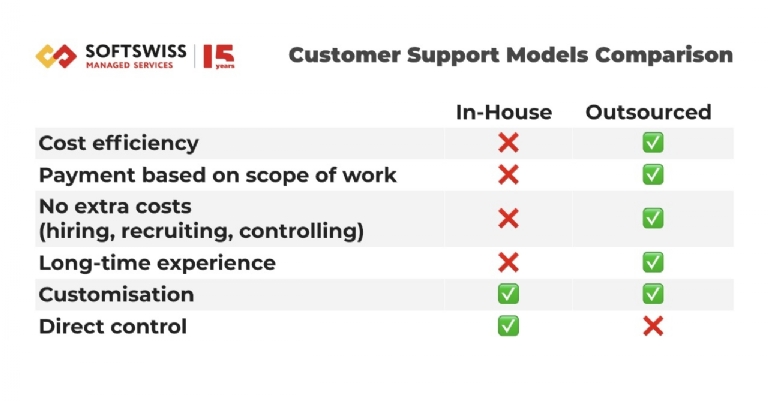

Through years of delivering high-quality customer support to its Casino Platform clients, SOFTSWISS Managed Services has earned strong recognition among industry leaders. In 2023-2024, the solution received several awards for its outstanding contributions to responsible gambling practices and excellence in customer support. Based on their profound experience, SOFTSWISS experts share their insights on organising customer support services.
In-house vs outsourced services: pros and cons
Cost savings, flexible payments depending on the project scope and workload, increased operational efficiency and access to specialised expertise are undeniable advantages of outsourcing customer support services. What is more, an outsourced support team eliminates the need for investing in recruiting, hiring, training, and managing staff, allowing businesses to focus on core operations while reducing overhead costs.
The key advantage of the in-house model and something outsourcing typically lacks is greater control over a project. At the same time, outsourcing frees up time and human resources, enabling operators to prioritise high-impact strategic initiatives instead of being tied up with routine service management tasks.
When it comes to customisation, experts generally do not classify it as a distinct advantage or disadvantage of either model. At SOFTSWISS, when launching any iGaming project, the team requests operators to complete a specialised questionnaire. The responses are then used to customise customer support services to the unique needs of each project.

Crucial customer support services
When setting up a back office for an iGaming project, the first step is to determine the ‘must-have’ services to be provided. Based on the SOFTSWISS expertise, the golden standard comprises the following:
The costs for setting up an in-house service to address the above functions start at 25,000 euro, whereas outsourcing can reduce these expenses by nearly half.
Enhanced customer support services
Several additional services play a critical role in increasing player loyalty, engagement, and lifetime value. SOFTSWISS experts highlight the following:
The minimal costs for additional services stand around 7,500 euro and differ only slightly whether organised in-house or outsourced. The challenge is independently setting up numerous unfamiliar processes from scratch, especially without prior experience. Additionally, some specialists may not be needed full-time, and arranging part-time work can often be inefficient.
“The choice of the appropriate model for the customer support organisation depends on the specific needs of a business. It should rely on the project’s life cycle stage, forecasts, management capabilities and a business approach tailored to geographic geography and local labour market opportunities,” commented Artyom Rudakov, Head of SOFTSWISS Managed Services.
“In some cases, a hybrid model, combining both in-house and outsourced support, can offer the best of both worlds. At the same time, the outsourced model allows the team to focus on project development and business growth.”
The SOFTSWISS will take part in the SBC Summit Lisbon on 24–26 September. To get more insights, partners can book a meeting at stand B-160.
Source: GMB